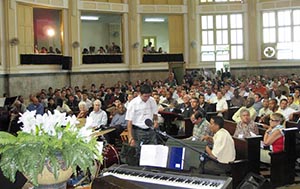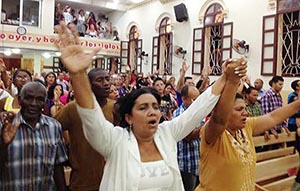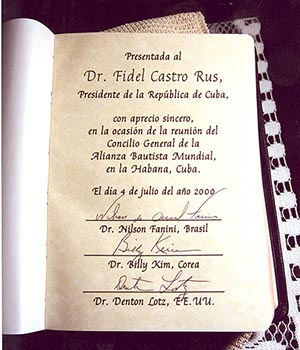By Bob Allen
Most Baptists in the United States with personal connections to Baptist communities in Cuba applauded President Obama’s surprise announcement Dec. 17 of plans to normalize relations between two nations separated by only 90 miles of water but five decades of political tension.
The new policy eases restrictions on travel for specific reasons including religious exchange, something of particular interest to Baptists in the two countries who have fostered friendships since Cuba relaxed restrictions on religious freedom in 1992.
 “We never expected this Christmas gift,” said Rubén Ortiz, pastor at La Primera Iglesia Bautista in Deltona, Fla., and current moderator of the Cooperative Baptist Fellowship of Florida.
“We never expected this Christmas gift,” said Rubén Ortiz, pastor at La Primera Iglesia Bautista in Deltona, Fla., and current moderator of the Cooperative Baptist Fellowship of Florida.
Ray Johnson, coordinator of the statewide CBF affiliate based in Lakeland, Fla., said he was still waiting to hear response from most of his friends in Miami, a city with a large Cuban-American population described in secular media as having a mixed opinion about the policy change.
“Personally, I am overwhelmed with joy for the Cuban people and the people of Florida who will have more opportunity now to discover the beauties of the island and of its people,” said Johnson, who first visited Cuba in 2008 and returned in 2012. “Yesterday was a very good day for our world.”
In 2008, CBF Florida began a relationship with the Eastern Cuba Baptist Convention, offering services including leadership training, Bibles and study resources, spiritual support and humanitarian aid.
Recently Ortiz, who was born in Cuba in 1972, returned to help lead a first-ever five-day spiritual academy offered through the Upper Room with sponsors including both national CBF and CBF Florida.
“This year has been a wonderful year for missions for Cuba,” Ortiz said. “I think this is part of what we were expecting, but not for Christmas.”
 Contributing to ‘human flourishing’
Contributing to ‘human flourishing’
Baptist World Alliance General Secretary Neville Callam also said he welcomed the diplomatic initiative.
“The people of Cuba, including the large Christian community there, stand to benefit from this development that represents a contribution to human flourishing,” said Callam.
Over the past 20 years, the Baptist World Alliance has passed two resolutions — including one in 2000 adopted during a meeting in Cuba of the BWA General Council — urging the United States to ease economic sanctions placed on the country.
A 1992 resolution noted “heavy burdens placed on the poor of … Cuba by the present trade embargo” and called for the “speedy removal of economic sanctions which impact leaders, while devastating the population at large.”
In 2000, the BWA affirmed “the urgency of the need for all nations and peoples to respect and support the human rights of all,” but also expressed its belief “that access to food and medicines is a basic human right and the denial of such access should not be used by nations as a tool of geopolitics.” It urged “governments to reconsider the appropriateness of the use of economic sanctions in the effort to encourage changes in political situations.”
“On behalf of the Baptist World Alliance, and in light of the position consistently taken by the BWA on the Cuban embargo throughout the years, I enthusiastically welcome the decision to begin to normalize U.S.-Cuba relations,” Callam said.
 American Baptist Churches USA leader Roy Medley said the U.S. decision will ease the suffering of Cubans.
American Baptist Churches USA leader Roy Medley said the U.S. decision will ease the suffering of Cubans.
“American Baptist Churches USA has long advocated for the normalization of relationships between our two countries, believing that the economic sanctions were creating undue hardship upon the poor while contributing nothing to our national security,” said Medley, ABCUSA general secretary. “We welcome the increased opportunities this will permit for relationships with the Baptists of Cuba.”
The ABCUSA has historic ties to Baptist conventions in Cuba, and has frequently urged the U.S. government both to lift sanctions and re-open diplomatic relations with the country.
Showing what democracy can accomplish
The Alliance of Baptists also has a close relationship with the Fraternity of Baptist Churches of Cuba, a group started by socially progressive churches expelled from the Baptist Convention of Western Cuba in 1989.
For years the Alliance has issued statements urging a thawing of U.S./Cuban relations, and especially the lifting of the embargo on Cuba put in place shortly after Fidel Castro and his communist rebels ousted dictator Fulgencio Batista in 1959.
The president’s announcement does not affect the embargo, but it includes other concessions the Alliance has urged in the past, such as review of Cuba’s designation as a state sponsor of terrorism and release of the last three members of the Cuban Five, an alleged spy ring freed Wednesday in a prisoner exchange described as a major factor in the diplomatic breakthrough.
“The Alliance thanks President Obama for moving to normalize relations with Cuba, and it encourages our congressional leadership to do even more,” leaders of the group said in a statement. “Let’s end the embargo and stop punishing average Cubans for something that happened before most of them were born. If we truly want to spread democracy, let’s show the Cuban people, and the world, what a democracy is capable of accomplishing.”
Two staff members at ChurchNet, also known as the Baptist General Convention of Missouri, reacted to the news with fresh memories of a recent visit to Cuba as part of a delegation of U.S. Baptists to the 40th anniversary celebration of the Coordination of Baptist Workers and Students in Cuba.
“Because of the Churchnet delegation to Cuba, I understand — and celebrate — the news more than I would have otherwise,” said Brian Kaylor, Churchnet communications and engagement team leader. “My visit also increases my surprise. Although President Obama campaigned in 2008 on normalizing relations with Cuba, I found in my discussions with Cubans that they feared meaningful changes still remained years or decades away.”
 Gary Snowden, leader of Churchnet’s missions mobilization team, said his short visit to the island doesn’t qualify him as an expert on Cuba, but he came away convinced that the economic embargo and sanctions against Cuba have done little or nothing to effect a regime change.
Gary Snowden, leader of Churchnet’s missions mobilization team, said his short visit to the island doesn’t qualify him as an expert on Cuba, but he came away convinced that the economic embargo and sanctions against Cuba have done little or nothing to effect a regime change.
“Those who have suffered most from the restrictions imposed by the embargo have been the Cuban people themselves,” said Snowden, who also serves as associate pastor at First Baptist Church in Lee’s Summit, Mo. “We heard many references during our visit to the ‘Special Period’ following the collapse of the Soviet Union and the tremendous hardships that the people suffered in that time when Russian economic support basically disappeared.”
A boon to religious exchange
Both Kaylor and Snowden welcomed opportunities for increased travel for religious exchange.
“I suspect that this measure will facilitate more groups being able to engage in short-term missions and humanitarian projects on the island,” Snowden said. “I was impressed in our meetings with Baptists both at the COEBAC gathering and in other settings by their firm commitment to not only share the gospel with their fellow citizens, but also to strive to improve the quality of life for all Cubans.”
 Kaylor, who until recently taught at James Madison University in Harrisonburg, Va., and has written books on political communications, said he believes easing travel restrictions is a positive development because: “I believe we need to get to know each other. As Americans visit Cuba and Cubans visit the U.S., we build relationships built on people not propaganda.”
Kaylor, who until recently taught at James Madison University in Harrisonburg, Va., and has written books on political communications, said he believes easing travel restrictions is a positive development because: “I believe we need to get to know each other. As Americans visit Cuba and Cubans visit the U.S., we build relationships built on people not propaganda.”
Ken Sehested, former executive director of the Baptist Peace Fellowship of North America who first visited Cuba in 1991, called the president’s announcement “stunning” but long overdue.
“The U.S. has normalized diplomatic and economic relations with a host of other countries with whom we have significant political disagreements,” he said. He attributed the long exception for Cuba to domestic political pressure from significant populations of Cuban expatriates in Florida and New Jersey, two large and important swing states in national elections.
According to reports in secular media, the White House tested political waters in South Florida before announcing the change, finding that younger-Cuban Americans are less committed to U.S. policy viewed as a vestige of the Cold War past and increasingly irrelevant to national security today.
“U.S./Cuba relations are effectively gentrifying,” Sehested said. “The older members of that fight are dying off, on both sides, so that the sheer irrationality of existing political policies are coming to the surface. Our history of relations with Cuba is beginning to crumble under the weight of its own incoherence.”
Sehested, now co-pastor of Circle of Mercy in Asheville, N.C., said what is tipping the balance is not the work of those who have been pushing for decades for normalization of U.S./Cuba relations in the political sphere, but rather economic interests.
“There are 11 million consumers in Cuba which U.S. businesses want to connect with,” Sehested said. He recalled a poignant anecdote from years ago about a lay leader in a Cuban church asked if he thought the U.S. economic embargo would ever end. His Cuban friend answered that it probably will, and perhaps soon, but added, “When that happens, my fear is that your country will simply buy my country.”
Not all Baptists agreed with the U.S. action. Southern Baptist Convention ethicist Russell Moore told Baptist Press, “I disagree with President Obama‘s decision to normalize relations with Cuba. I tend to think engagement and trade is better than disengagement, but Cuba is a special case, a terrorist-sponsoring, human rights-violating dictatorship located just miles away from our border. I don‘t trust the Castro regime to keep the promises they are making.”
Other SBC leaders, including some from the denomination‘s International Mission Board, expressed cautious support.
Previous stories:
